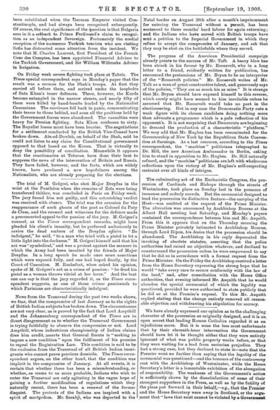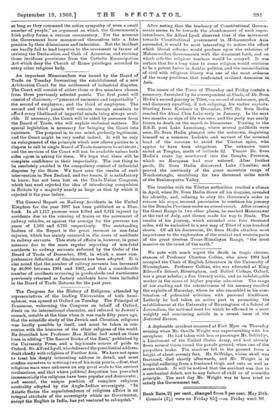We have already expressed our opinion as to the challenging
character of the procession as originally designed, and it is an, open secret that leading Roman Catholics regarded it as an injudicious move. But it is none the less most unfortunate that by their eleventh-hour intervention the Government should have let it be thought either that they were entirely ignorant of what was public property weeks before, or that they were waiting for a lead from sectarian prejudice. They had a strong case, but they declined to state it—note that the Premier went no further than saying that the legality of the ceremonial was qtiestioned—and the honours of the controversy_ rest with the Archbishop of Westminster, while the Home Secretary's letter is a lamentable exhibition of the abnegation of responsibility. The weakness of the Government's action is sufficiently shown by the dissatisfaction of some of their strongest supporters in the Press, as well as by the futility of the pleas put forward iii their behalf,—a.g., that the Premier and the Home Secretary were away in Scotland, or the argil- pent that " laws that exist cannot be violated by a (itovernment:
se long as they command the active sympathy of even a small number of people," an argument on which the Government's Irish policy forms a curious commentary. For the moment the Government have manoeuvred themselves into a false position by their dilatoriness and indecision. But the incident can hardly fail to lend impetus to the movement in favour of revising the Declaration and Oath of Accession, and excising those invidious provisions from the Catholic Emancipation Act which deny the Church of Rome privileges accorded to every other religious body.











































 Previous page
Previous page